Submitted:
11 April 2024
Posted:
11 April 2024
You are already at the latest version
Abstract
Keywords:
1. Introduction
2. Overview of Conventional EIS and Interpretation of Impedance Spectra
3. Broadband Excitations for EIS
3.1. CMSS
3.2. CPMS
3.3. MSBS
4. Architecture of Presented High-Speed Multichannel EIS System
5. Experimental Validation and Discussion
5.1. Sinusoidal Sweep, CMSS, CPMS and Presented MSBS Comparison
5.2. Validation of Presented Multi-Channel Fast EIS System Using Commercial EIS Instrument
5.3. Validation of Impedance Spectra through KK Transform
5.4. Measurement speed comparison with sinusoidal sweep perturbation
- Broadband MSBS perturbation is used instead of sinusoidal sweep excitation to shorten the measurement.
- 8-channels configuration is used which further decrease the measurement time and increase the capability by simultaneously measuring the impedance spectrums of eight individual batteries or eight battery modules with overall voltage less than 100 V.
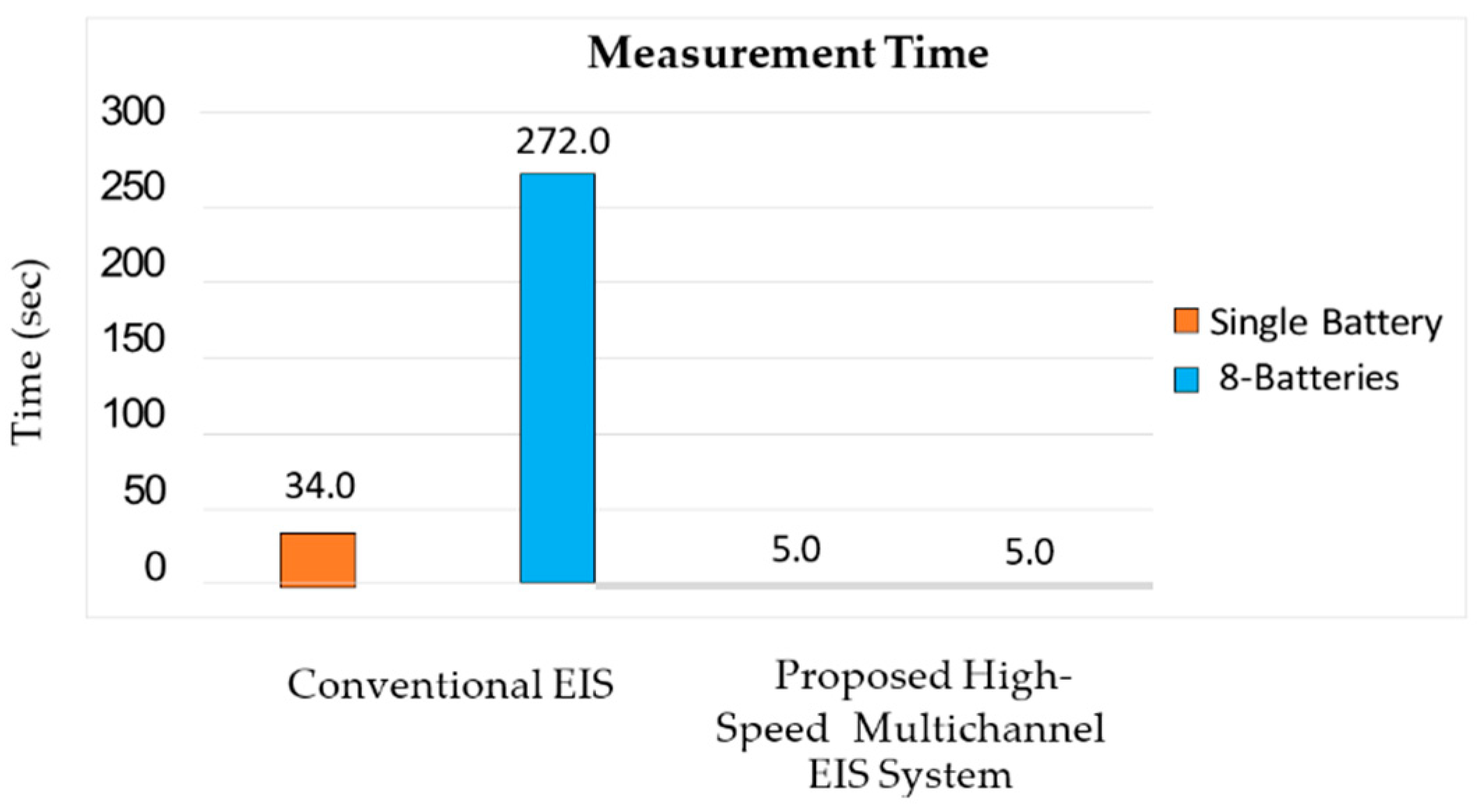
6. Conclusion
Author Contributions
Funding
Conflicts of Interest
References
- A. El Mejdoubi, H. Chaoui, H. Gualous, P. Van Den Bossche, N. Omar and J. Van Mierlo, "Lithium-Ion Batteries Health Prognosis Considering Aging Conditions," in IEEE Transactions on Power Electronics, vol. 34, no. 7, pp. 6834-6844, July 2019. [CrossRef]
- Q. Shi, Z. Jiang, Z. Wang, X. Shao and L. He, "State of Charge Estimation by Joint Approach With Model-Based and Data-Driven Algorithm for Lithium-Ion Battery," in IEEE Transactions on Instrumentation and Measurement, vol. 71, pp. 1-10, 2022, Art no. 3000610. [CrossRef]
- S. S. Afshari, S. Cui, X. Xu and X. Liang, "Remaining Useful Life Early Prediction of Batteries Based on the Differential Voltage and Differential Capacity Curves," in IEEE Transactions on Instrumentation and Measurement, vol. 71, pp. 1-9, 2022, Art no. 6500709. [CrossRef]
- S. Bamati and H. Chaoui, "Lithium-Ion Batteries Long Horizon Health Prognostic Using Machine Learning," in IEEE Transactions on Energy Conversion, vol. 37, no. 2, pp. 1176-1186, June 2022. [CrossRef]
- I. Sanz-Gorrachategui et al., "Remaining Useful Life Estimation for LFP Cells in Second-Life Applications," in IEEE Transactions on Instrumentation and Measurement, vol. 70, pp. 1-10, 2021, Art no. 2505810. [CrossRef]
- Alexander Farmann, Wladislaw Waag, Andrea Marongiu, Dirk Uwe Sauer,Critical review of on-board capacity estimation techniques for lithium-ion batteries in electric and hybrid electric vehicles, Journal of Power Sources, Volume 281, 2015, Pages 114-130, ISSN 0378-7753. [CrossRef]
- R. Xiong, Y. Zhang, J. Wang, H. He, S. Peng and M. Pecht, "Lithium-Ion Battery Health Prognosis Based on a Real Battery Management System Used in Electric Vehicles," in IEEE Transactions on Vehicular Technology, vol. 68, no. 5, pp. 4110-4121, May 2019. [CrossRef]
- D. Liu, W. Xie, H. Liao and Y. Peng, "An Integrated Probabilistic Approach to Lithium-Ion Battery Remaining Useful Life Estimation," in IEEE Transactions on Instrumentation and Measurement, vol. 64, no. 3, pp. 660- 670, March 2015. [CrossRef]
- J. Vetter, P. Novák, M.R. Wagner, C. Veit, K.-C. Möller, J.O. Besenhard, M. Winter, M. Wohlfahrt-Mehrens, C. Vogler, A. Hammouche, Ageing mechanisms in lithium-ion batteries, Journal of Power Sources, Volume 147, Issues 1–2, 2005, Pages 269-281, ISSN 0378- 7753. [CrossRef]
- Y. Gao et al., "Health-Aware Multiobjective Optimal Charging Strategy With Coupled Electrochemical-Thermal-Aging Model for Lithium-Ion Battery," in IEEE Transactions on Industrial Informatics, vol. 16, no. 5, pp. 3417-3429, May 2020. [CrossRef]
- S. J. Moura, J. L. Stein and H. K. Fathy, "Battery-Health Conscious Power Management in Plug-In Hybrid Electric Vehicles via Electrochemical Modeling and Stochastic Control," in IEEE Transactions on Control Systems Technology, vol. 21, no. 3, pp. 679-694, May 2013. [CrossRef]
- Q. Zhang, C. -G. Huang, H. Li, G. Feng and W. Peng, "Electrochemical Impedance Spectroscopy Based State-of-Health Estimation for Lithium- Ion Battery Considering Temperature and State-of-Charge Effect," in IEEE Transactions on Transportation Electrification, vol. 8, no. 4, pp. 4633-4645, Dec. 2022. [CrossRef]
- Nina Meddings, Marco Heinrich, Frédéric Overney, Jong-Sook Lee, Vanesa Ruiz, Emilio Napolitano, Steffen Seitz, Gareth Hinds, Rinaldo Raccichini, Miran Gaberšček, Juyeon Park,Application of electrochemical impedance spectroscopy to commercial Li-ion cells: A review, Journal of Power Sources, Volume 480, 2020, 228742, ISSN 0378-7753. [CrossRef]
- A. Fischer, A. Y. Kallel and O. Kanoun, "Comparative Study of Excitation Signals for Microcontroller-based EIS Measurement on Li-Ion Batteries," 2021 International Workshop on Impedance Spectroscopy (IWIS), Chemnitz, Germany, 2021, pp. 44-47. [CrossRef]
- Q. Zhang, C. -G. Huang, H. Li, G. Feng and W. Peng, "Electrochemical Impedance Spectroscopy Based State-of-Health Estimation for Lithium- Ion Battery Considering Temperature and State-of-Charge Effect," in IEEE Transactions on Transportation Electrification, vol. 8, no. 4, pp. 4633-4645, Dec. 2022. [CrossRef]
- Z. Xia and J. A. Abu Qahouq, "Evaluation of Parameter Variations of Equivalent Circuit Model of Lithium-ion Battery under Different SOH Conditions," 2020 IEEE Energy Conversion Congress and Exposition (ECCE), Detroit, MI, USA, 2020, pp. 1519-1523. [CrossRef]
- Stefan Skoog, Sandeep David, Parameterization of linear equivalent circuit models over wide temperature and SOC spans for automotive lithium-ion cells using electrochemical impedance spectroscopy, Journal of Energy Storage, Volume 14, Part 1, 2017, Pages 39-48, ISSN 2352-152X. [CrossRef]
- E. Din, C. Schaef, K. Moffat and J. T. Stauth, "A Scalable Active Battery Management System With Embedded Real-Time Electrochemical Impedance Spectroscopy," in IEEE Transactions on Power Electronics, vol. 32, no. 7, pp. 10.1109/TPEL.2016.2607519. 5688-5698, July 2017. [CrossRef]
- Robert R. Richardson, Peter T. Ireland, David A. Howey, Battery internal temperature estimation by combined impedance and surface temperature measurement, Journal of Power Sources, Volume 265, 2014, Pages 254- 261, ISSN 0378-7753. [CrossRef]
- H. Zappen, F. Ringbeck, and D. Sauer, “Application of Time-Resolved Multi-Sine Impedance Spectroscopy for Lithium-Ion Battery Characterization,” Batteries, vol. 4, no. 4, p. 64, Dec. 2018. [CrossRef]
- J. Sihvo, D. -I. Stroe, T. Messo and T. Roinila, "Fast Approach for Battery Impedance Identification Using Pseudo-Random Sequence Signals," in IEEE Transactions on Power Electronics, vol. 35, no. 3, pp. 2548-2557, March 2020. [CrossRef]
- A. Y. Kallel and O. Kanoun, "A Crest-Factor Optimization Algorithm for Multisine Signals based on the Evolutionary Role Playing Game Theory," 2021 International Workshop on Impedance Spectroscopy (IWIS), Chemnitz, Germany, 2021, pp. 131-136. [CrossRef]
- M. Schroeder, "Synthesis of low-peak-factor signals and binary sequences with low autocorrelation (Corresp.)," in IEEE Transactions on Information Theory, vol. 16, no. 1, pp. 85-89, January 1970. [CrossRef]
- Ojarand, Jaan & Min, Mart. (2017). Recent Advances in Crest Factor Minimization of Multisine. Elektronika ir Elektrotechnika. 23. [CrossRef]
- A. Van Den Bos, "A new method for synthesis of low-peak-factor signals," in IEEE Transactions on Acoustics, Speech, and Signal Processing, vol. 35, no. 1, pp. 120-122, January 1987. [CrossRef]
- Yang, Yuxiang & Zhang, Fu & Tao, Kun & Sanchez, Benjamin & Wen, He & Teng, Zhaosheng. (2015). An improved crest factor minimization algorithm to synthesize multisines with arbitrary spectrum. Physiological Measurement. 36. [CrossRef]
- E. Van der Ouderaa, J. Schoukens and J. Renneboog, "Peak factor minimization of input and output signals of linear systems," in IEEE Transactions on Instrumentation and Measurement, vol. 37, no. 2, pp. 207- 212, June 1988. [CrossRef]
- J. Sihvo, T. Messo, T. Roinila, R. Luhtala and D. I. Stroe, "Online identification of internal impedance of Li-ion battery cell using ternary- sequence injection," 2018 IEEE Energy Conversion Congress and Exposition (ECCE), Portland, OR, USA, 2018, pp. 2705-2711. [CrossRef]
- T. Roinila and T. Messo, "Online Grid-Impedance Measurement Using Ternary-Sequence Injection," in IEEE Transactions on Industry Applications, vol. 54, no. 5, pp. 5097-5103, Sept.-Oct. 2018. [CrossRef]
- M. T. Talat and A. H. Khawaja, "Li-Ion Battery Parameter Identification Using Pseudo Random Noise," 2019 15th International Conference on Emerging Technologies (ICET), Peshawar, Pakistan, 2019, pp. 1-5. [CrossRef]
- M. Schönleber, D. Klotz, E. Ivers-Tiffée, A Method for Improving the Robustness of linear Kramers-Kronig Validity Tests, Electrochimica Acta, Volume 131, 2014, Pages 20-27, ISSN 0013-4686. [CrossRef]
- R. Al Nazer, V. Cattin, P. Granjon, M. Montaru and M. Ranieri, "Broadband Identification of Battery Electrical Impedance for HEVs," in IEEE Transactions on Vehicular Technology, vol. 62, no. 7, pp. 2896-2905, Sept. 2013. [CrossRef]
- E. Barsoukov and J. R. Macdonald. Impedance spectroscopy: Theory, experiment, and applications. Second edition. 2005. isbn: 0-471-64749-7.
- Koch, R. and Jossen, A. and Kanoun, “On-line Electrochemical Impedance Spectroscopy for Lithium-Ion Battery Systems” Universitätsbibliothek der TU München, 2017.
- https://www.brs-messtechnik.de/produktuebersicht-de (accessed on 22 November 2023).
- Karlsruhe Institute of Technology. Lin-KK Software Tool. Available online: https://www.iam.kit.edu/et/english/Lin-KK.php (accessed on 12 December 2023).
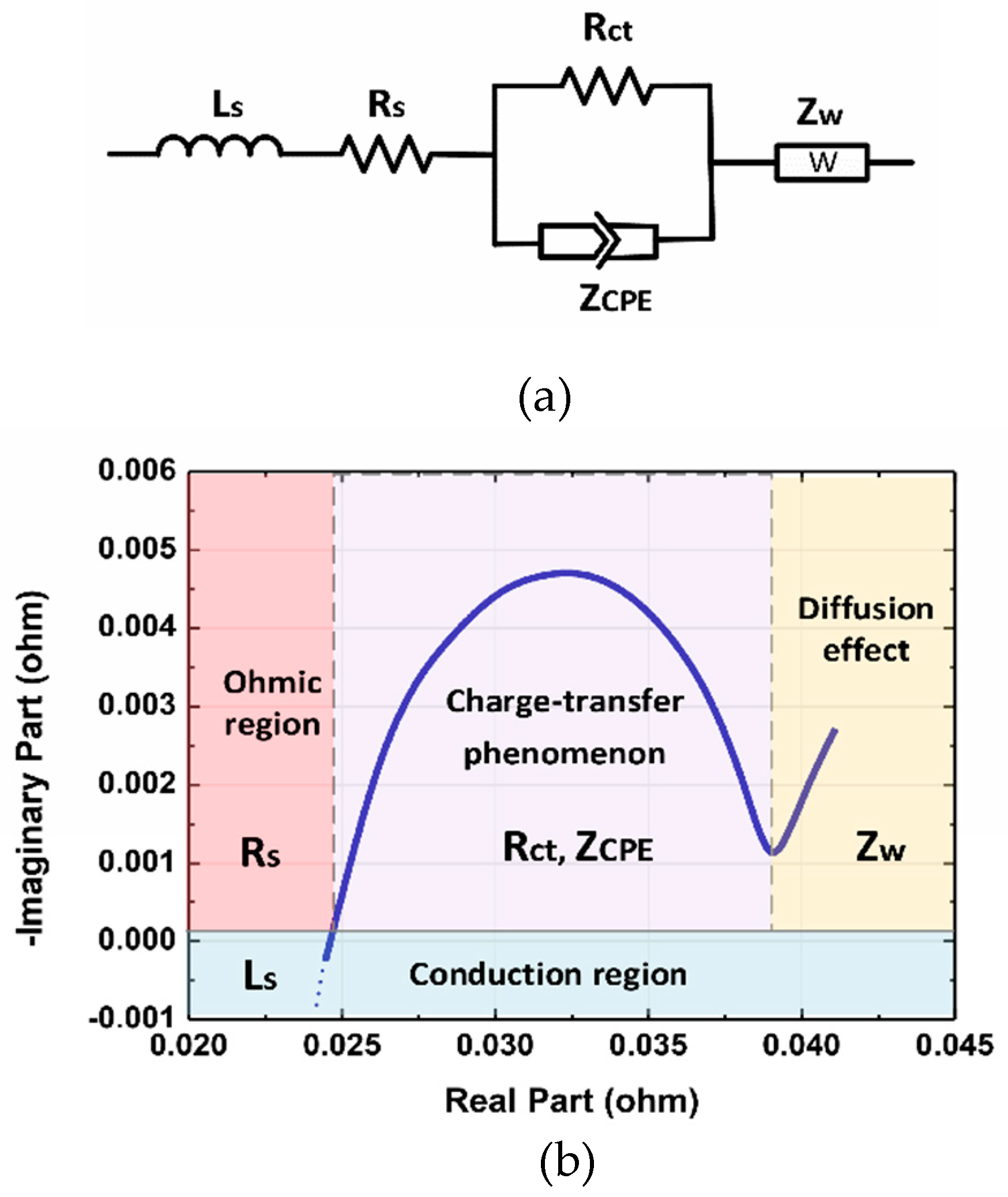
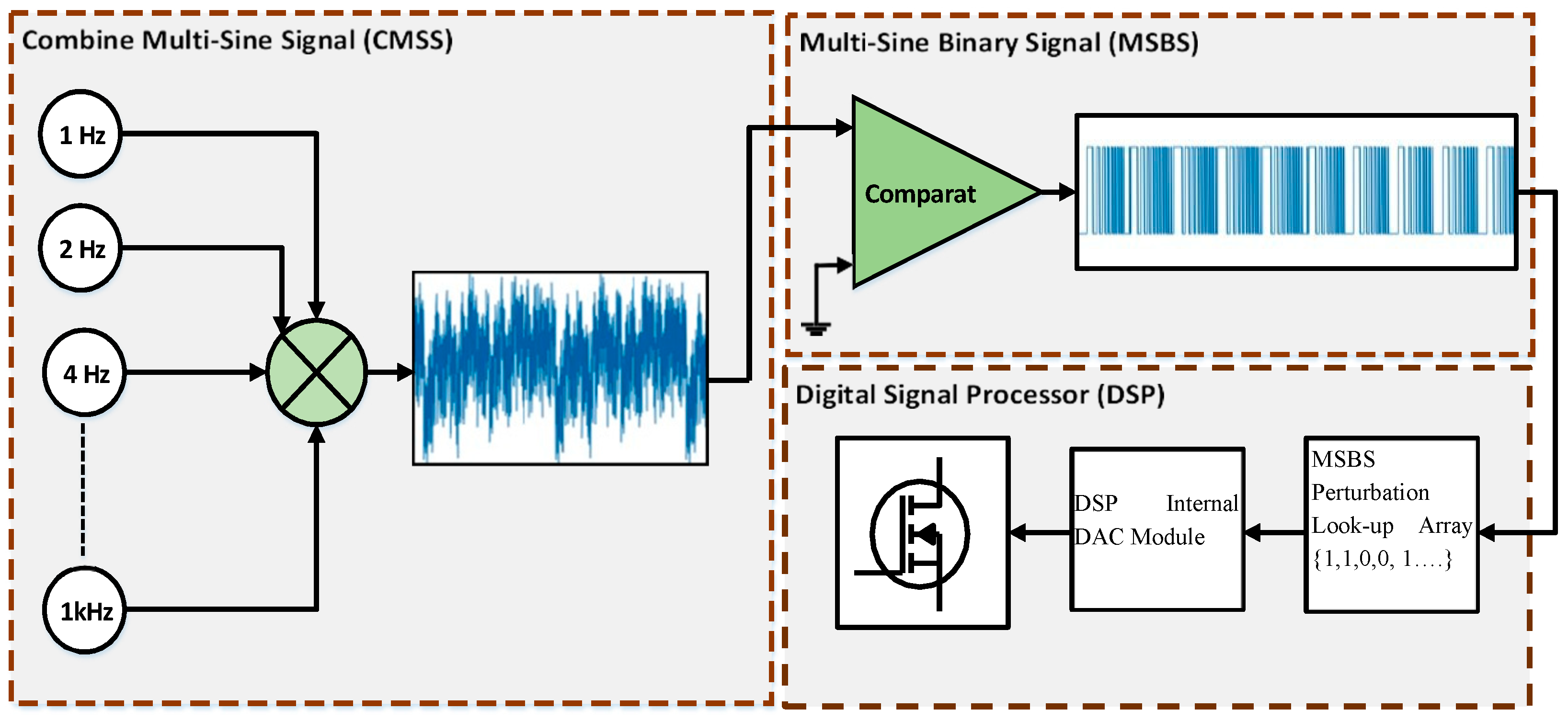
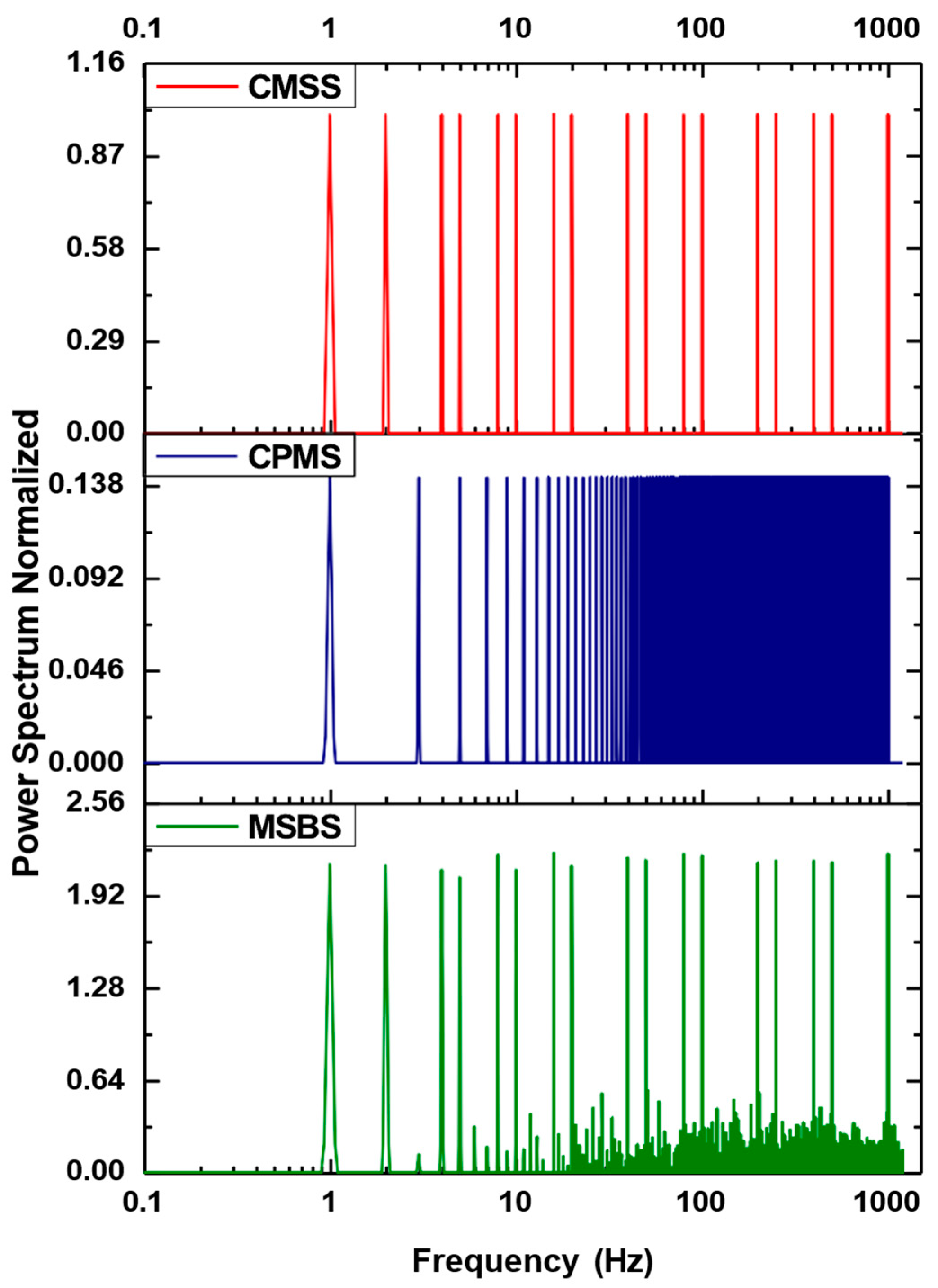
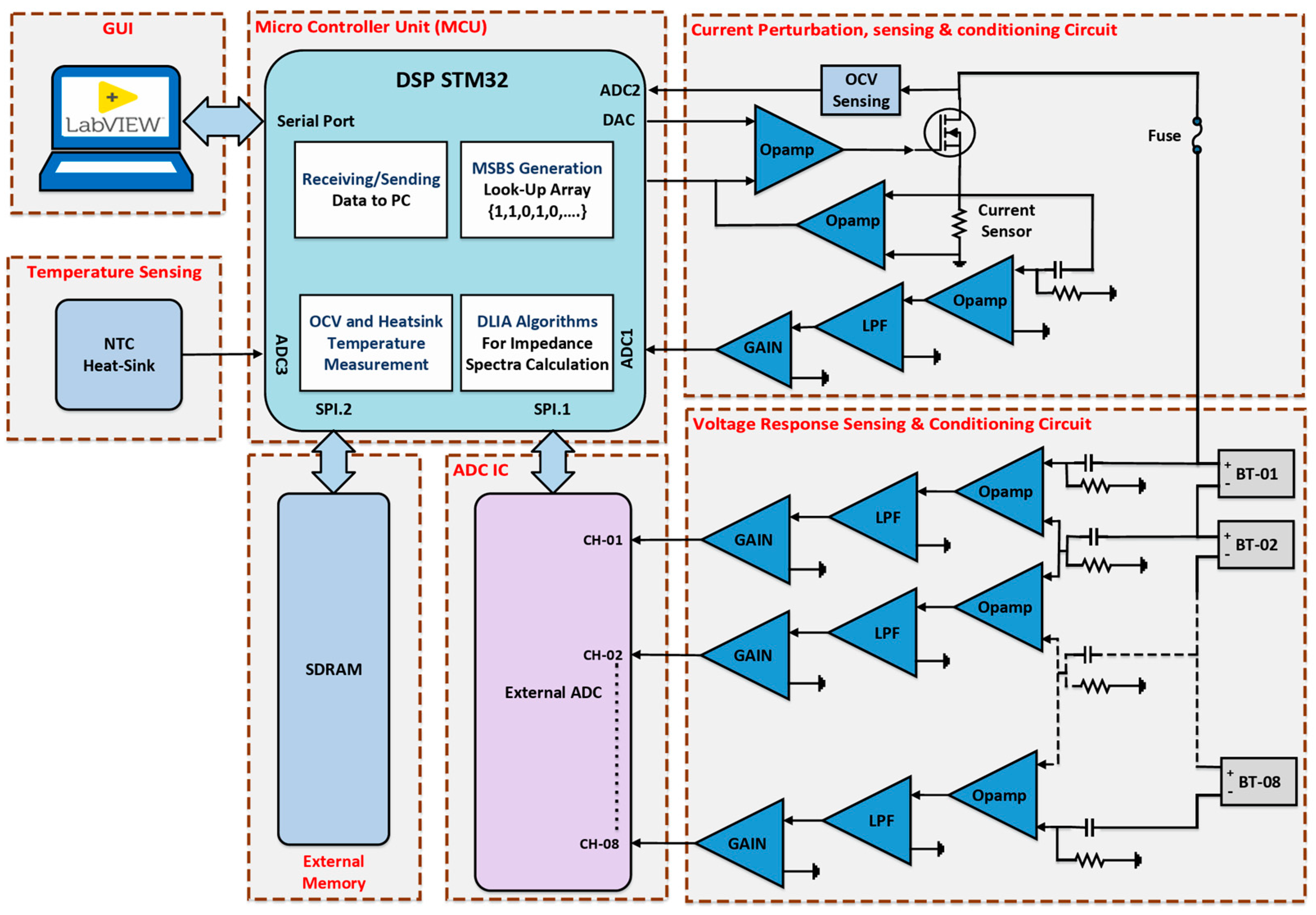
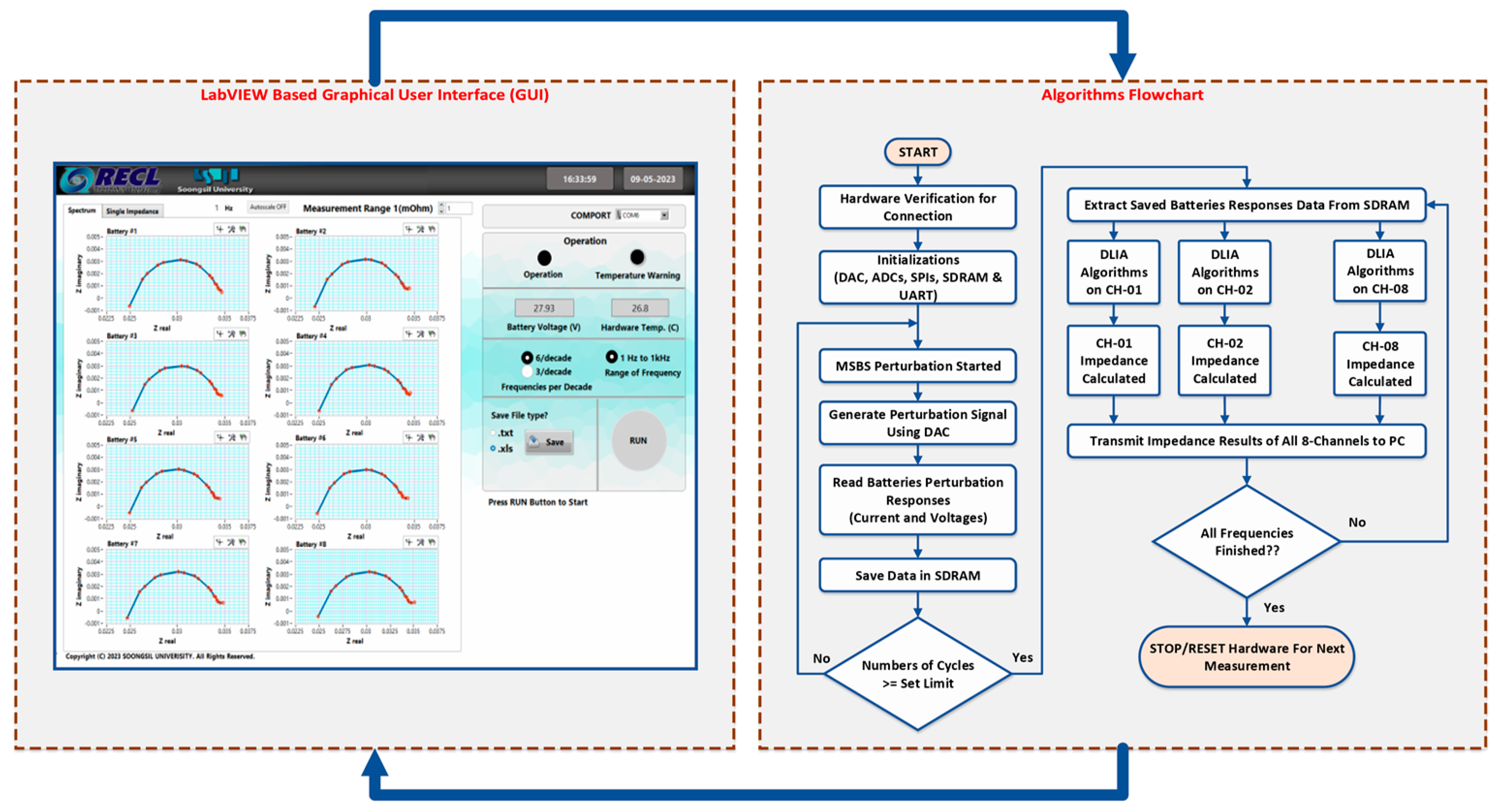
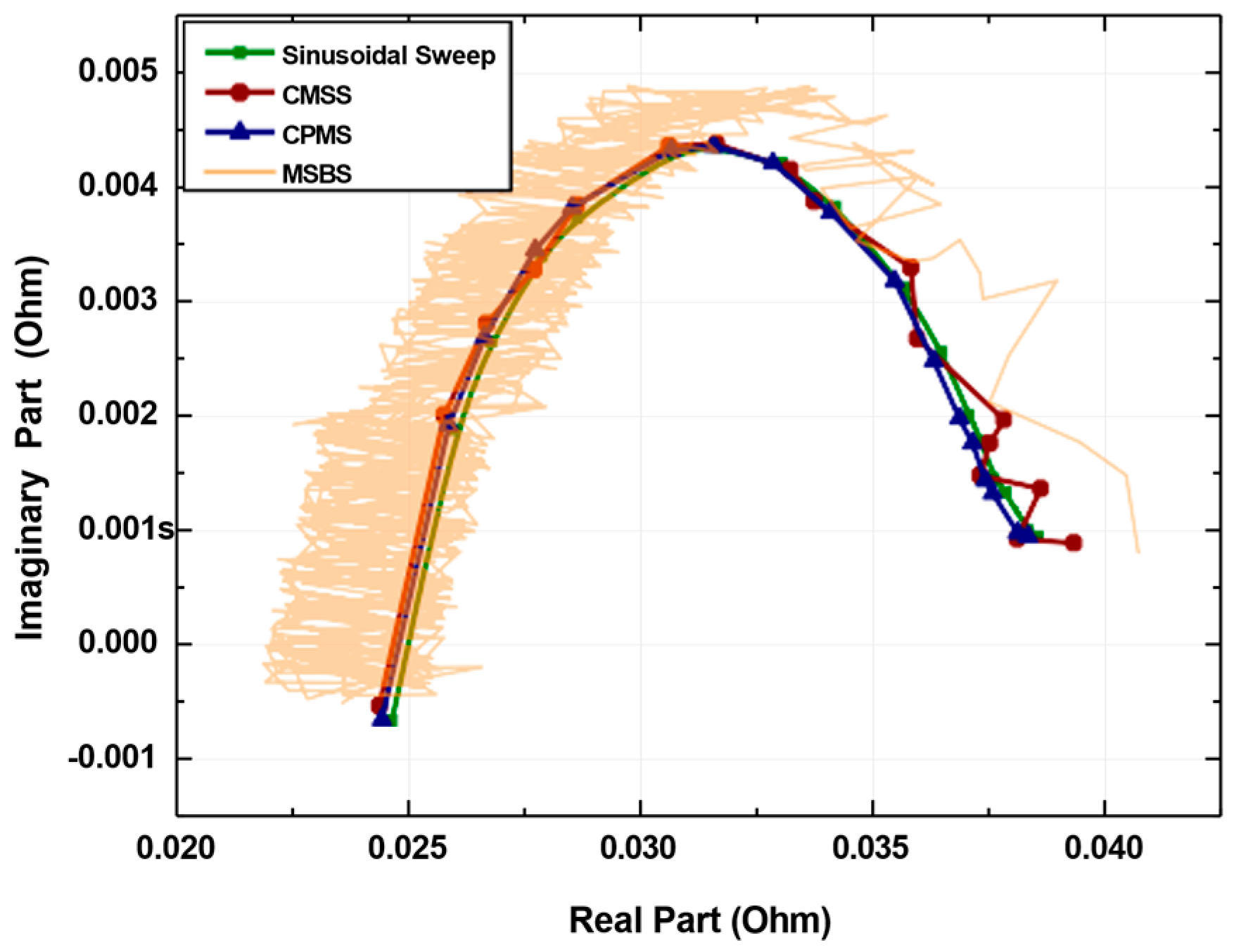
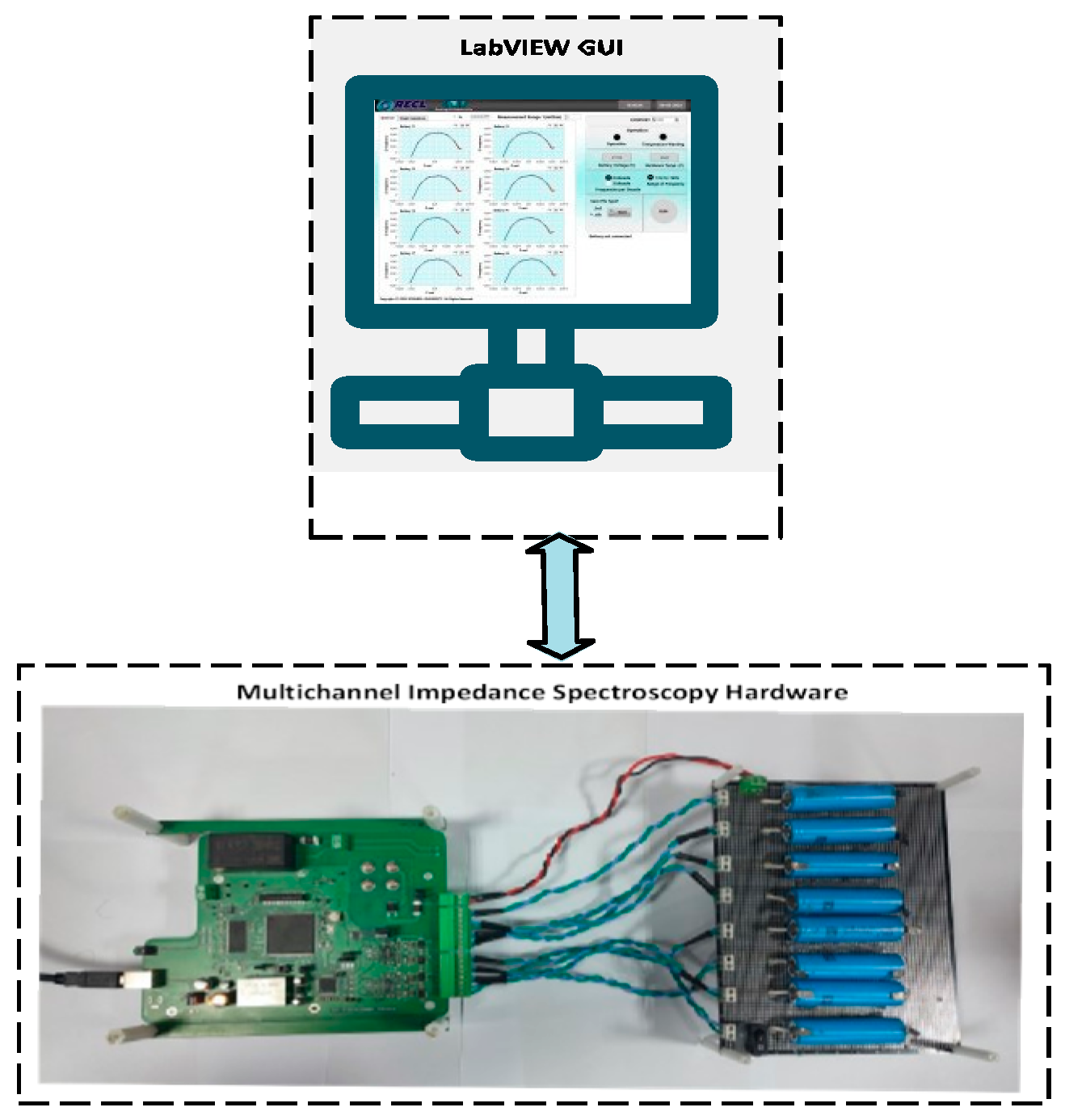


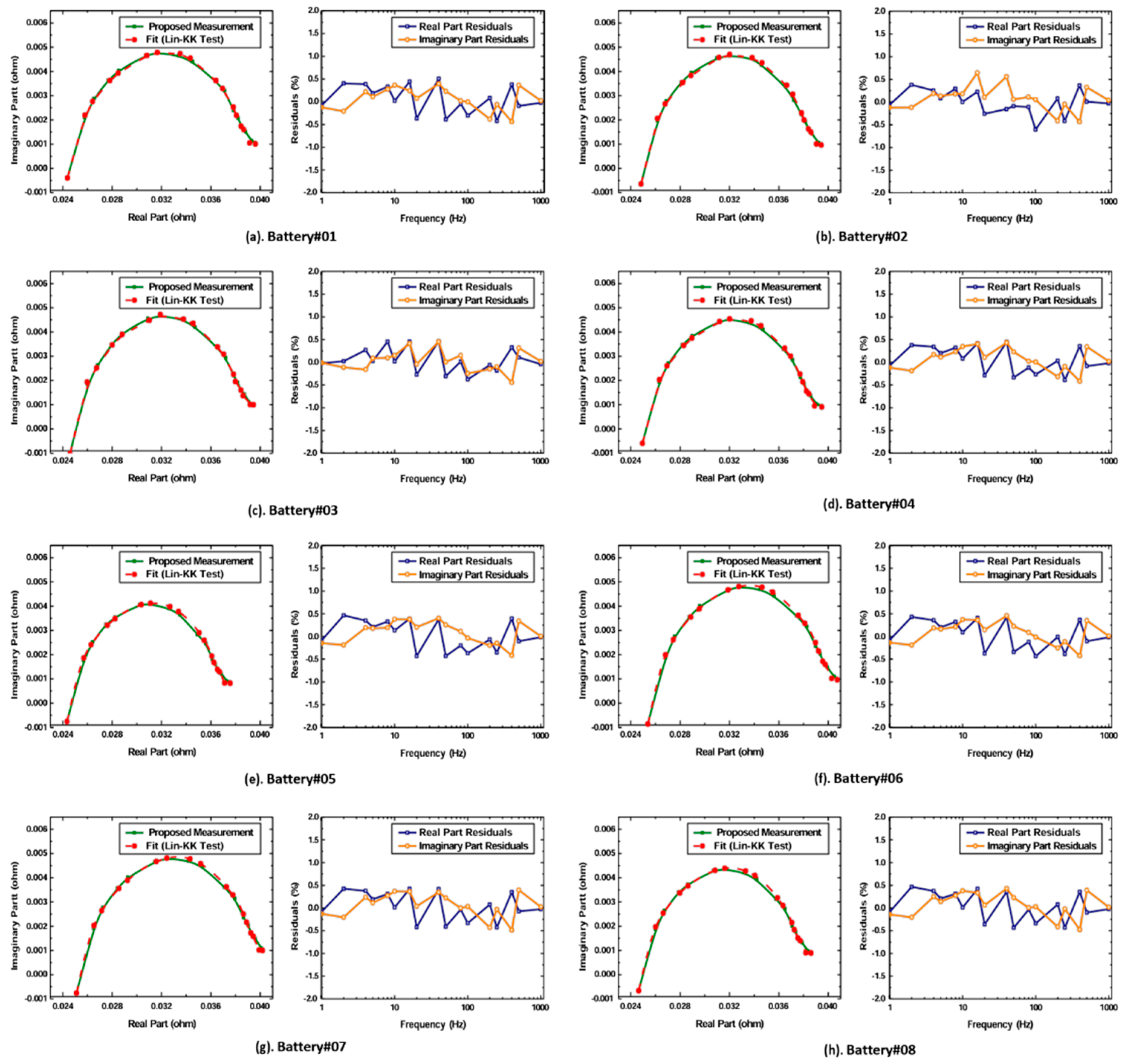
| Battery Model | Nominal Voltage | OCV | Capacity |
| Samsung INR18650-29E | 3.65 V | 3.50 | 2.850 Ah |
| Parameter | Sinusoidal Sweep | CMSS | CPMS | MSBS |
| Frequency range | 1 Hz to 1kHz | |||
| Sampling frequency | 40kHz | |||
| Frequency components | 17 | 17 | 500 | 17 |
| Frequency distribution | random | random | linear | random |
| Pk to Pk Current | 1.0 A | |||
| Length in time | 60.0 sec | 1.0 sec | 1.0 sec | 1.0 sec |
| Method | CMSS | CPMS | MSBS |
| RMSE % | 7.68 % | 24.53 % | 0.51 % |
| S. No | R-Chi Squared | Chi-Squared Error (%) |
| Battery-01 | 3.28×10−5 | 0.572 |
| Battery-02 | 3.54×10−5 | 0.594 |
| Battery-03 | 3.78×10−5 | 0.641 |
| Battery-04 | 3.94×10−5 | 0.628 |
| Battery-05 | 3.18×10−5 | 0.563 |
| Battery-06 | 3.09×10−5 | 0.556 |
| Battery-07 | 3.32×10−5 | 0.576 |
| Battery-08 | 3.41×10−5 | 0.583 |
| Parameter | Conventional EIS | Developed high- speed multichannel EIS system |
| Perturbation type | Sinusoidal Sweep | MSBS |
| Frequency range | 1 Hz to 1kHz | 1 Hz to 1kHz |
| Frequency components | 17 | 17 |
| Measurement Time | ||
| Single Battery | 34.0 sec | 5.0 sec |
| Eight (8) Batteries | 272.0 sec | 5.0 sec |
Disclaimer/Publisher’s Note: The statements, opinions and data contained in all publications are solely those of the individual author(s) and contributor(s) and not of MDPI and/or the editor(s). MDPI and/or the editor(s) disclaim responsibility for any injury to people or property resulting from any ideas, methods, instructions or products referred to in the content. |
© 2024 by the authors. Licensee MDPI, Basel, Switzerland. This article is an open access article distributed under the terms and conditions of the Creative Commons Attribution (CC BY) license (http://creativecommons.org/licenses/by/4.0/).





